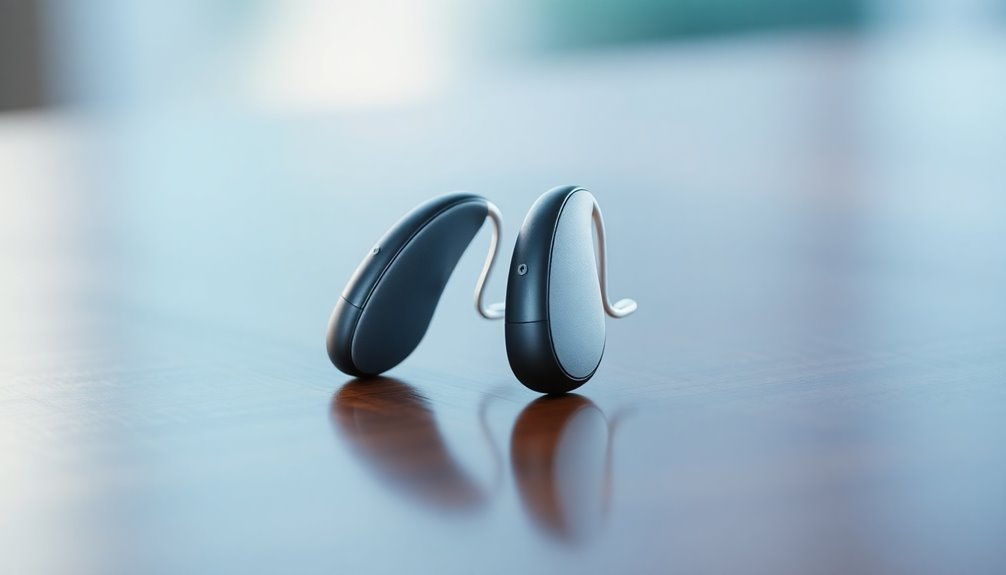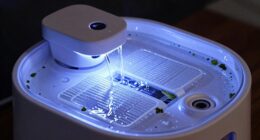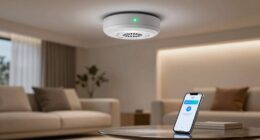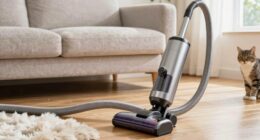I've discovered the 15 best hearing aids for clearer sound and comfort in 2025, specifically designed for seniors and adults. These options include rechargeable, invisible earbuds and supermini designs that enhance speech clarity while offering superior comfort. With advanced noise cancellation technology, ergonomic shapes, and long battery life, they're perfect for anyone with mild to severe hearing loss. Keep exploring to find out which features set each model apart for your unique needs.
Key Takeaways
- Look for hearing aids with advanced noise cancellation technology for clearer sound, improving conversation clarity in noisy environments.
- Choose lightweight and ergonomic designs to ensure comfort during extended wear, making them feel almost invisible.
- Opt for rechargeable models offering long battery life, with quick recharge times to minimize downtime.
- Consider user-friendly features like simple controls and multiple hearing modes for diverse listening environments.
- Ensure fit and comfort with various earplug sizes, addressing individual ear shapes for secure placement.
Hearing Aids for Seniors and Adults (Rechargeable, Invisible Earbuds)
If you're looking for a solution that offers both clarity and comfort, these rechargeable, invisible earbuds are perfect for seniors and adults facing severe hearing loss. They're not just compact and discreet, resembling Bluetooth headsets, but they also pack a punch with advanced noise reduction technology. I love that they recharge easily and provide up to 20 hours of hearing time on a quick charge. Plus, the user-friendly design means I can adjust the volume and choose the right earplugs for comfort. I've seen how these aids can improve communication and enhance quality of life, making them an ideal gift for loved ones.
Best For: Seniors and adults experiencing severe hearing loss who value discretion and comfort in their hearing aids.
Pros:
- Noise Reduction: Advanced DSP technology enhances sound clarity by effectively minimizing background noise.
- Rechargeable Design: Offers up to 20 hours of hearing time on a quick charge, eliminating the need for frequent battery purchases and saving money.
- User-Friendly: Simple setup with adjustable volume and multiple earplug sizes ensures comfort and ease of use.
Cons:
- Adaptation Period: Users may require 4 to 8 weeks to fully acclimate to the new sounds, which could be challenging for some.
- Cleaning Maintenance: Requires bi-weekly cleaning to maintain optimal performance, which may be a hassle for some users.
- Limited Range: May not be suitable for individuals with extremely profound hearing loss who may need more powerful hearing solutions.
Supermini Rechargeable Hearing Aids
For anyone seeking superior sound quality without the bulk of traditional hearing aids, the Supermini Rechargeable Hearing Aids are an excellent choice. These digital devices are 30% smaller than most CIC options and feature a design that fits naturally in your ear. With 16-channel sound processing, they deliver clear speech even in noisy environments. I love the compact charging box, providing up to 250 hours of backup power after just two hours of charging. They're comfortable for all-day wear, and users report quick adaptation. Overall, these aids combine advanced technology with comfort, making them a top pick for anyone needing hearing support.
Best For: Individuals seeking a discreet, comfortable, and advanced hearing solution that offers superior sound quality in various environments.
Pros:
- Compact and lightweight design makes them 30% smaller than most CIC devices, ensuring comfort and invisibility.
- Rechargeable battery provides up to 250 hours of backup power, allowing for a week of use after a full charge.
- User-friendly controls and quick adaptation reported by users enhance the overall experience.
Cons:
- May require initial adjustments that some users could find challenging without assistance.
- The effectiveness in extremely loud environments may vary depending on individual circumstances.
- Limited sizing options may not provide a perfect fit for everyone despite the variety of earbud sizes.
WEIYI Rechargeable Digital Hearing Amplifier for Seniors
The WEIYI Rechargeable Digital Hearing Amplifier stands out as an ideal choice for seniors seeking clearer sound and comfort. Weighing just 6 grams, its ergonomic design fits snugly in the ear. I love how it features advanced DSP digital chips, offering four adjustable modes for different environments, making conversations feel effortless. With a remarkable 40-hour battery life, I don't have to worry about frequent recharging. Plus, the included earplugs guarantee a perfect fit, preventing any annoying whistling. Customer support is responsive, and I appreciate the positive feedback from users who've experienced improved quality of life thanks to this device.
Best For: Seniors seeking a comfortable and effective hearing solution that enhances sound clarity in various environments.
Pros:
- Lightweight design (6 grams) ensures comfort during extended use.
- Four adjustable modes cater to different listening environments, improving audio clarity.
- Impressive 40-hour battery life reduces the need for frequent recharging.
Cons:
- May require time to find the perfect earplug fit to prevent whistling.
- Some users might need assistance with initial setup and adjustments.
- Limited advanced features compared to more expensive hearing aids.
Not Amplifier True Hearing Aids for Seniors (Rechargeable with Noise Cancellation)
Seniors seeking a reliable solution for clearer sound and enhanced comfort will find the Not Amplifier True Hearing Aids to be an exceptional choice. With 16-channel advanced DSP technology, these rechargeable hearing aids deliver superior noise cancellation, ensuring conversations are crystal clear. I love how lightweight and discreet they are, fitting comfortably in my ears for long hours without discomfort. Plus, with an impressive 18-hour battery life, I can recharge them easily during meals. They truly enhance my connection with loved ones, considerably reducing feelings of loneliness. Overall, they've been a game-changer for my hearing experience.
Best For: Seniors seeking a discreet, reliable, and high-quality hearing solution to enhance their social interactions and overall quality of life.
Pros:
- Advanced noise cancellation technology ensures clear conversations in various environments.
- Lightweight and discreet design allows for comfortable, long-term wear without drawing attention.
- Impressive 18-hour battery life with convenient recharging options enhances usability throughout the day.
Cons:
- Not suitable for individuals with severe hearing loss, as they are designed as entry-level hearing aids.
- Initial adjustment period may be needed for users unfamiliar with hearing aids.
- Limited features compared to high-end hearing aids, which may not satisfy all users' needs.
Hearing Aids for Seniors, Rechargeable Receiver-in-Canal with Noise Cancelling
Designed specifically for older adults, these rechargeable Receiver-in-Canal (RIC) hearing aids combine advanced technology with user-friendly features to enhance everyday listening experiences. I love how the 16-channel digital chip adjusts to my needs, providing clear sound even in noisy settings. With six volume levels and various modes, I can easily switch between general, noise reduction, and tinnitus masking options. The battery life impresses me too—up to 20 hours on a single charge! Their lightweight design fits comfortably behind my ear, and I appreciate how intuitive the controls are. These hearing aids truly make conversations enjoyable again.
Best For: Seniors who seek a comfortable and user-friendly hearing aid solution to improve their listening experiences in various environments.
Pros:
- Intuitive controls allow for easy volume and mode adjustments, making it suitable for seniors.
- Lightweight and discreet design ensures comfort and blends well with skin tone for a natural look.
- Long battery life of up to 20 hours per charge, along with an additional 80-100 hours from the charging case.
Cons:
- Limited to RIC design, which may not suit everyone's preferences or needs.
- Potential feedback issues if not properly fitted or adjusted.
- Requires regular charging, which may be challenging for some seniors to manage.
Rechargeable Hearing Amplifier for Seniors with Noise Cancelling
For those seeking a reliable solution to enhance their hearing experience, the rechargeable hearing amplifier stands out as an excellent choice. It's designed specifically for seniors and accommodates mild to severe hearing loss. With dual microphone technology, it improves sound clarity across four modes: Indoor, Outdoor, Noisy Outdoor, and Music. I appreciate the comfort of its lightweight design and soft ear domes, perfect for extended wear. Users love its noise-cancelling features and the clarity during conversations. Plus, the included accessories make it easy to use. Overall, this amplifier greatly enhances hearing and boosts quality of life.
Best For: Seniors experiencing mild to severe hearing loss seeking a comfortable and effective hearing amplification solution.
Pros:
- Noise-cancelling technology significantly enhances conversation clarity and reduces background noise.
- Lightweight and ergonomic design allows for extended wear without discomfort.
- User-friendly controls and multiple hearing modes cater to various environments and situations.
Cons:
- Minor inconsistencies in the operation guide may lead to confusion regarding program modes.
- Replacement domes may only be available through complete kits, limiting options for users.
- Some users reported initial discomfort and fit issues that required adjustments.
Pro Hearing Aids for Seniors with Auto-Noise Cancelling
If you're seeking a solution to improve communication in challenging environments, Pro Hearing Aids with auto-noise cancelling technology could be your perfect match. These aids use a cutting-edge digital chip with 32 channels for superior sound clarity, filtering out background noise effortlessly. Weighing only 2 grams, they're comfortable and discreet, fitting seamlessly with eyeglasses. I love the intelligent features that adjust to different sound scenarios automatically. Plus, the UV cleaning in the charging case keeps everything hygienic. Users rave about clearer conversations and boosted confidence in social settings. With rechargeable batteries, they're convenient and ready when you are!
Best For: Seniors experiencing mild to severe hearing loss who seek a discreet and effective solution for improved communication.
Pros:
- Superior sound clarity with 32-channel digital chip technology that filters background noise for enhanced conversations.
- Comfortable and lightweight design at only 2 grams, ideal for extended wear and compatible with eyeglasses.
- Hygienic features including built-in UV germicidal cleaning in the charging case, ensuring ear hygiene.
Cons:
- Some users report unimpressive sound quality and concerns about the materials feeling cheap in certain instances.
- A few reviews mention dissatisfaction with the charging case, citing a lack of additional features or capabilities.
- While the majority of feedback is positive, there are occasional critiques regarding specific functionalities that may not meet everyone's expectations.
Not Amplifier True Invisible Rechargeable Hearing Aids for Seniors
Seniors seeking a discreet and effective hearing solution will find the Not Amplifier True Invisible Rechargeable Hearing Aids to be an ideal choice. Their nearly invisible design means I can wear them without drawing attention, perfect for social settings. With advanced noise cancellation, I enjoy clear conversations even in crowded places. Plus, they're rechargeable—no more hassle with batteries! The lightweight, ergonomic design guarantees comfort all day long, so I forget I'm wearing them. Friends have noticed how much clearer my speech has become, and I love how easy they are to use. They make a thoughtful gift for any senior needing better hearing.
Best For: Seniors looking for a discreet, effective, and comfortable hearing solution that enhances their quality of life.
Pros:
- Nearly invisible design allows for discreet use in social and professional settings.
- Advanced noise cancellation technology ensures clear conversations in noisy environments.
- Rechargeable with long battery life, eliminating the hassle of changing disposable batteries.
Cons:
- May not provide the same level of amplification as traditional hearing aids for those with severe hearing loss.
- Initial adjustment period may be required for some users to adapt to the device.
- Limited customization options compared to more advanced hearing aid models.
Hearing Amplifier Rechargeable Hearing Aid Device for Seniors
Designed with simplicity in mind, the Hearing Amplifier Rechargeable Hearing Aid Device stands out as an excellent option for older adults seeking clear sound and comfort. I love how its auto-gain-control automatically adjusts sound levels, making conversations effortless. The directional noise-canceling mic is fantastic for tuning out background noise, ensuring I can focus on what matters. Plus, it recharges in just one hour and lasts up to 120 hours! I appreciate the pocket-sized design and easy one-knob control. While some may find the headphones a bit tricky, overall, this device offers an impressive, cost-effective alternative to traditional hearing aids.
Best For: Seniors seeking a user-friendly and affordable alternative to traditional hearing aids that provides clear sound amplification.
Pros:
- Auto-gain-control for effortless sound adjustments during conversations.
- Directional noise-canceling mic that enhances focus on important sounds while minimizing background noise.
- Rechargeable battery lasting up to 120 hours with a quick one-hour charging time.
Cons:
- Some users may find the headphone size and fit challenging, leading to discomfort.
- Reports of charging issues and potential design improvements needed for user experience.
- Complexity in setup for some older users may lead to returns and dissatisfaction.
Rechargeable Hearing Aids for Seniors with Intelligent Noise Cancellation
For those experiencing hearing loss, rechargeable hearing aids with intelligent noise cancellation offer a remarkable solution. I love how these devices provide natural and clear audio, making conversations easier to follow. With a peak sound gain of 38 dB, they cater to various levels of hearing loss. The ergonomic design guarantees comfort, and they're lightweight, so I barely notice I'm wearing them. Plus, they charge in just two hours, lasting up to 28 hours, which is perfect for my busy days. The intuitive buttons make adjustments a breeze, enhancing my overall experience with sound clarity in any environment.
Best For: Seniors experiencing mild to severe hearing loss who seek a comfortable and effective hearing solution.
Pros:
- Excellent sound quality with natural audio and effective background noise cancellation.
- Lightweight and ergonomic design ensures comfort for extended wear.
- Quick charging time of 2 hours with up to 28 hours of use, plus an extended battery life with the charging case.
Cons:
- May have a learning curve for users unfamiliar with hearing aid technology.
- Limited customization options compared to more expensive prescription hearing aids.
- Performance may vary depending on individual hearing loss and environmental factors.
Hearing Aids for Seniors Rechargeable with Noise Cancelling
When it comes to enhancing sound clarity and comfort, these rechargeable hearing aids stand out as the perfect choice for older adults who want to enjoy conversations and media without the hassle of constant battery changes. With five adjustable volume levels, I can personalize my listening experience to suit various environments. The noise-cancelling technology effectively reduces background noise, allowing me to focus on what matters. Plus, the lightweight design and multiple earplug sizes guarantee comfort throughout the day. I appreciate that a single charge lasts up to 25 hours, making them incredibly convenient for my daily routine.
Best For: Seniors seeking an effective, comfortable, and easy-to-use hearing solution that enhances sound clarity and reduces background noise.
Pros:
- Rechargeable design eliminates the need for battery replacements, providing up to 25 hours of use on a single charge.
- Noise-cancelling technology significantly reduces background noise, enhancing focus on conversations and media.
- Lightweight and compact design with multiple earplug sizes ensures comfort for long-term wear.
Cons:
- May require a learning curve for users unfamiliar with digital hearing aids.
- Initial cost may be higher compared to traditional hearing aids that use disposable batteries.
- Charging case may be an additional item to carry for those who travel frequently.
Rechargeable Digital Hearing Aids for Seniors with UV Cleaning Charging Case
Seniors seeking a reliable solution for hearing loss will appreciate the rechargeable digital hearing aids with a UV cleaning charging case, which offers not just convenience but also hygiene. With a 16-channel digital sound processing chip, these aids provide impressive sound gain while filtering out background noise. Their micro invisible design makes them comfortable and virtually unnoticeable. I love the one-touch control for volume adjustments and the automatic on/off feature. Plus, the wireless charging case recharges in just 1-2 hours, ensuring I get up to 20 hours of use. It's a smart, cost-effective choice that enhances my daily life!
Best For: Seniors experiencing mild to severe hearing loss who desire a discreet and effective hearing aid solution.
Pros:
- Noise-canceling feature enhances clarity in conversations by filtering background noise.
- Compact charging case with UV sterilization ensures hygiene and convenience.
- Cost-effective alternative with comparable technology to traditional hearing aids.
Cons:
- May not be suitable for individuals with profound hearing loss requiring more advanced solutions.
- Limited to a specific design that may not fit everyone's personal preferences.
- Battery life may vary depending on usage and environmental factors.
Rechargeable Hearing Aids for Seniors with Noise Cancellation
If you're looking for an effective solution to enhance your hearing experience, rechargeable hearing aids equipped with noise cancellation are an excellent choice for seniors facing hearing loss. With a 16-channel digital chip, these devices optimize sound in real-time, providing a peak gain of 38 dB. I love how they excel in noisy environments, allowing me to distinguish conversations from background sounds effortlessly. Plus, they charge in just 2 hours and last up to 28 hours, making them perfect for travel. Lightweight and easy to use, they've truly transformed my listening experience while ensuring comfort throughout the day.
Best For: Seniors with mild to severe hearing loss looking for an effective and budget-friendly hearing aid solution.
Pros:
- Excellent sound quality with natural audio and effective background noise cancellation.
- Lightweight design and ergonomic fit make them comfortable for all-day wear.
- Fast charging capability, providing up to 28 hours of use on a single charge.
Cons:
- May not be suitable for individuals with profound hearing loss.
- Limited advanced features compared to some high-end prescription hearing aids.
- Initial adjustment period may be needed for users unfamiliar with hearing aids.
Hearing Aids for Seniors, Rechargeable RIC with Noise Reduction
For those experiencing mild to moderate hearing loss, the Rechargeable RIC hearing aids with noise reduction offer an exceptional blend of comfort and performance. Weighing just 2.8 grams, their discreet design fits seamlessly, making them nearly invisible. The soft materials guarantee comfort during long wear, while the open fit ear domes let air and sound flow naturally. With dual microphones, I enjoy clear conversations without annoying feedback. Plus, the rechargeable battery lasts up to 18 hours, eliminating the hassle of tiny batteries. Three preset modes cater to different environments, enhancing my social interactions and overall confidence.
Best For: Seniors experiencing mild to moderate hearing loss who seek a discreet and comfortable hearing solution.
Pros:
- Lightweight and discreet design makes them nearly invisible, enhancing user confidence.
- Rechargeable battery lasts up to 18 hours and eliminates the need for frequent battery replacements.
- Multiple preset modes allow users to adapt to different social settings effortlessly.
Cons:
- Limited to mild to moderate hearing loss, making them unsuitable for individuals with severe hearing impairment.
- Charging case may be bulky for some users, making portability an issue.
- Initial investment cost may be higher compared to traditional hearing aids using disposable batteries.
Hearing Aids for Seniors, Rechargeable and Waterproof
Designed specifically for those experiencing mild to moderate hearing loss, these rechargeable and waterproof hearing aids offer the perfect blend of technology and convenience. With 11 channels and advanced DSP chips, I find the enhanced noise cancellation truly impressive. Just take them out of the magnetic charging case, and they're ready to go. The three professional modes adapt seamlessly to different environments, whether I'm in a quiet room or a bustling street. They not only amplify sound naturally but also help me reconnect with loved ones, reducing feelings of isolation and boosting my cognitive health. It's a game-changer!
Best For: Seniors experiencing mild to moderate hearing loss who seek convenience and effective sound amplification.
Pros:
- Advanced noise cancellation technology for clearer sound quality.
- Rechargeable and waterproof design for everyday use and durability.
- Multiple hearing modes tailored for various environments enhance user experience.
Cons:
- May not be suitable for individuals with severe hearing loss.
- Initial cost may be higher compared to traditional amplifiers.
- Some users may require time to adjust to the different hearing modes.
Factors to Consider When Choosing Hearing Aids Not Amplifiers

When I'm choosing hearing aids, I focus on several key factors that go beyond just amplification. Sound quality, noise cancellation, and comfort are essential to guarantee I get the best experience. I also consider battery life and user-friendly controls to make my daily life easier.
Sound Quality Considerations
Choosing the right hearing aids can be overwhelming, especially with so many options available that focus on sound quality. I recommend looking for devices with advanced digital signal processing (DSP) technology, as they filter background noise and enhance clarity, creating a more natural listening experience. Opt for hearing aids with multiple channels—16 or more—to customize sound for different environments, whether you're in a quiet room or a bustling café. Adjustable volume settings and specific modes can also boost your ability to hear conversations clearly. Don't overlook the design and comfort of the earplugs, as a secure fit minimizes feedback. Finally, consider battery life and charging convenience to guarantee uninterrupted listening throughout your day.
Noise Cancellation Features
After considering sound quality, it's important to look into noise cancellation features in hearing aids. These devices use advanced DSP chips to filter out background noise, allowing me to engage in clearer conversations. I've noticed that many models come with multiple channels, sometimes ranging from 11 to 32, which enhances their ability to isolate human voices from ambient sounds. Effective noise cancellation means I can focus on what matters, like dialogue in a movie or conversations at social events, without distractions. Some hearing aids even offer specialized modes tailored for different environments, ensuring I get peak performance whether I'm in a quiet room or on a busy street. Ultimately, this technology greatly improves my communication and satisfaction.
Battery Life and Charging
Battery life and charging options are essential factors in selecting the right hearing aids for my needs. I look for models with rechargeable batteries that deliver at least 18 to 28 hours of use on a single charge, ensuring I won't need frequent recharges throughout my day. A charging case is a must-have for me, as it can notably extend battery life and provide multiple charges without needing an outlet. Quick recharge times, ideally within 1 to 2 hours, help minimize downtime. I also appreciate features like automatic on/off functions when placed in the charging case, enhancing convenience. Ultimately, some devices offer up to 100 hours of extra usage with their cases, making them great for travel or extended outings.
Comfort and Fit
Finding the right hearing aid isn't just about battery life; comfort and fit play a significant role in my overall experience. A proper fit guarantees my hearing aids stay securely in place, reducing discomfort during long hours of wear. I appreciate that many models come with various sizes of earplugs or domes, allowing me to find the most effective fit for my unique ear shape. Lightweight designs are a must for me; they make the devices feel almost invisible. Plus, when hearing aids are ergonomically designed to follow the natural contours of my ear, they enhance both comfort and sound quality. Soft materials in the ear domes add to my comfort, letting me wear them for extended periods without irritation.
User-Friendly Controls
When choosing hearing aids, user-friendly controls are essential for a smooth experience. I know how important this is, especially for seniors who might struggle with technology or have limited dexterity. Many modern hearing aids feature intuitive buttons or simple one-knob volume controls, allowing for easy adjustments without complicated settings. I appreciate how some devices come with clear voice prompts or visual indicators to guide me through changes in volume and mode. Accessibility is prioritized, so even those with visual impairments can use them comfortably. Plus, some models have automatic settings that adjust based on the environment, which greatly reduces the need for manual tweaks. This makes my experience not just comfortable but also hassle-free.
Design and Discretion
While comfort and sound quality are essential, the design and discretion of hearing aids can greatly impact my willingness to wear them. Many modern options are nearly invisible, blending seamlessly with my skin tone, which is a huge plus in social settings. I appreciate that ergonomic designs guarantee comfort during all-day wear, often weighing just a few grams and using skin-friendly materials. The compact size fits comfortably in my ear canal without pressure. Plus, advanced noise cancellation technology enhances sound clarity while reducing background noise, making conversations easier without drawing attention to the device. When I feel confident wearing discreet hearing aids, I'm more likely to engage fully in social interactions, improving my overall quality of life.
Adaptation Period Required
Adjusting to hearing aids isn't just a matter of putting them in; it requires an acclimatization period that can last from 4 to 8 weeks. During this time, my brain starts to reconnect with sounds I've missed for years, which can be overwhelming. I've noticed an increase in background noise awareness, but I remind myself it usually improves. Adjustments to volume and settings are common, and I often find myself tweaking them until I get it just right. I've also learned that support from audiologists is invaluable; they help navigate these challenges. The key is regular use of the hearing aids, as it's essential for my brain to adapt and enhance sound clarity and communication.
Frequently Asked Questions
How Do I Know if I Need a Hearing Aid?
I remember wondering if I needed a hearing aid myself. If you find you're straining to hear conversations or often asking people to repeat themselves, it might be time to contemplate one. I noticed I was missing sounds, like birds chirping or the doorbell ringing. If you struggle with background noise or feel tired after socializing, don't hesitate to consult an audiologist. They can help you understand your hearing health better.
Are Hearing Aids Covered by Insurance Plans?
Are hearing aids covered by insurance plans? I know this can be a confusing topic. It really depends on your specific insurance provider and plan. Some plans do cover hearing aids, while others might only cover a portion of the cost or none at all. I recommend checking directly with your insurance company to understand what's included. It's worth exploring, as it can greatly ease the financial burden of getting the help you need.
What Is the Average Lifespan of Hearing Aids?
Have you ever wondered how long those tiny devices will actually last? I've done my research and found that, on average, hearing aids typically last about 3 to 7 years. Factors like usage, care, and technology advancements can all play a part in their lifespan. I always recommend keeping an eye on their performance; if they start acting up, it might be time for a check-up or even a replacement.
Can Hearing Aids Connect to Smartphones or Other Devices?
Sure, hearing aids can definitely connect to smartphones and other devices. I've found that many modern hearing aids come equipped with Bluetooth technology, which lets me stream calls, music, and more directly to my devices. It's incredibly convenient! When I use my smartphone, I can easily adjust settings or switch programs through an app, making my experience much more personalized. So yes, they're pretty tech-savvy these days!
How Often Should I Get My Hearing Aids Serviced?
Getting your hearing aids serviced is like maintaining a car; regular check-ups keep it running smoothly. I usually schedule a service every six months, but it can depend on your usage and lifestyle. If you notice any changes in sound clarity or comfort, don't wait until the next appointment. It's essential to keep them in top shape for the best listening experience, so I recommend staying proactive about maintenance.
Conclusion
As I explored the world of hearing aids, I discovered a remarkable variety that truly enhances sound without simply amplifying it. Picture yourself effortlessly guiding through conversations, free from the frustration of background noise. Whether you're drawn to sleek designs or advanced noise cancellation, the perfect hearing aid is waiting for you. Don't settle for less—imagine the clarity and comfort that await as you embrace life's sounds anew. Your journey to better hearing starts now.























